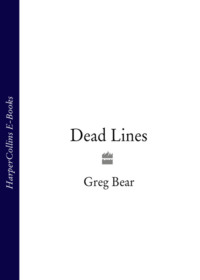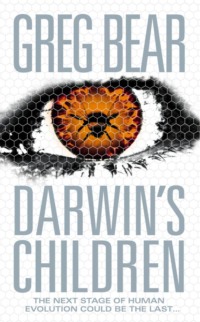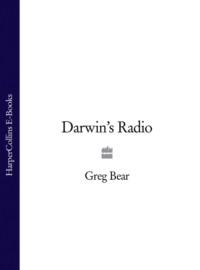
Полная версия
Vitals
‘Wasn’t there some dispute?’
‘A few of the faculty disagreed with my work. But my papers still get published, Ms Shun. I am still a reputable scientist.’
‘Owen is fond of oddball thinking, and even fonder of tweaking academic whiskers. But I hate to see him disappointed, Dr Cousins.’
‘Hal.’
She shook her head politely; keep it business. ‘Owen needs something to commit to. Something solid.’
Betty Shun left me with Montoya on the west wing’s biggest porch, overlooking the boat cove. It was eleven-thirty. We talked pleasantries for a while and listened to the splash of the waves, blankets over our legs, sipping from chilled glasses of draft beer, our heads warmed by radiant heaters. Did I like baseball? Montoya owned a baseball team in Minneapolis. I conversed as much about baseball as I could, having read USA Today in the Hotel W that afternoon.
Then Montoya drew back to our main topic.
‘You don’t say much about reduced caloric intake,’ he said. ‘According to most experts, that’s the only antiaging technique proven to work.’
‘It’s just the tip of the iceberg,’ I said.
‘You haven’t sunk your harpoon yet, Hal. I need to know more – much more.’ He smiled wearily. Make or break.
I put my glass on the center table and leaned forward. ‘The real problem is that we breathe. We respire. We accumulate poisons over time because of the way we burn fuel. We’re part of a vast biological conspiracy, billions of years old, and we have to shake ourselves loose and grab the reins.’
‘You’ve experimented on yourself, haven’t you?’ Montoya asked.
‘I’d rather keep some things confidential until we firm up a relationship.’
‘You have experimented,’ he said, brooking no dissent. ‘You’ve injected yourself with virus shells delivering modified genes, but nobody knows which genes, nobody on my payroll, anyway.’
‘I’ve taken one or two things beyond the theoretical stage,’ I admitted.
Montoya lifted his eyes to meet mine. ‘And?’
‘Obviously, I didn’t screw it up too badly. I’m still here. But it’s just the beginning,’ I said. ‘Until I know why individual obsolescence took hold a few billion years ago, I’m still going to grow old and die. And so will you.’
I was still being vague, and I knew it. The sweat under my armpits chafed.
‘So far we’ve been dancing around the center. It’s been a great dance, but I need something more. I’ve signed your NDA, Hal.’ Montoya smiled, putting on the patented charm that had brought him so far in the business world. ‘Give me a hint what’s behind door number one. It’ll be worth a few days on my ship, gratis. I’ll put that in writing, too, if you want.’
‘No need,’ I said, swallowing.
‘I’m all ears. I have all night.’
‘It won’t take that long,’ I said, mentally arranging my cue cards. This was probably going to be the most important speech of my life. ‘I start by altering a few genes in E. coli, common gut bacteria.’ I tapped my abdomen. ‘Then I modify a few of my own genes…‘
‘Radical gene therapy,’ Montoya mused.
‘Some call it that,’ I said. ‘But it’s just baby steps to solving an ancient murder mystery. Who designed us to die, and why? It turns out we’re being betrayed by cellular organelles, little organs, called mitochondria. Mitochondria make ATP. ATP is the molecule our cells use to store and release energy. Once upon a time, mitochondria were bacteria. We know that because they have their own little loops of DNA, like bacterial chromosomes.’
He watched me intently. ‘Respiration…seems pretty important. Breathing, using oxygen, right?’
I nodded.
‘So why do we let old bacteria do that for us?’
‘Mitochondria used to live free, a few billion years ago. Then they invaded primitive host cells, became parasites. Eventually, the hosts – our one-celled ancestors – found that the invaders had a talent. They were eight times better at converting sugar molecules into ATP. We formed a symbiotic partnership. The mitochondria became essential. Now, we can’t live without them.’
‘And mitochondria tell us when to grow old and die?’
‘They have a big say.’
He pinched and tugged his earlobe. ‘Explain.’
‘The mitochondria turn state’s evidence. Kind of a fifth column. They monitor our stress levels, track our physical and mental health, and pass that information on to tiny bacteria hiding in our tissues.’
‘We have germs in our tissues?’ Montoya asked, frowning. ‘Doesn’t the immune system clean them out?’
‘Some bacteria burrow deep and hide out for years. They trigger diseases like atherosclerosis – clogging the arteries.’
‘So what if I just spend my life relaxing? No stress.’
‘Everything we do causes different kinds of stress,’ I said. ‘You can’t stay healthy without some stress. But if we fail at our job, if we’re unlucky in love, if we get sick, if we’re feeling angry or frustrated or sad, our bodies fill with stress hormones. Bacteria and viruses mount challenges to our immune system, and the immune system is more likely to fail. But even if the immune system doesn’t fail, over time, for some reason, we don’t recover as quickly. We accumulate genetic errors in our cells. We deteriorate. We get weaker. The mitochondrial network reads these signs and reports to the deep-tissue bacteria, and the whole conspiracy tattles to the bugs in our gut. The bugs, in turn, tell the mitochondria to work less efficiently. That’s the ultimate cause of aging. Together, they act as judge, jury, and ultimately, executioner.’
‘That’s a lot to swallow all at once,’ Montoya said. ‘I’m skeptical about bacteria communicating and cooperating. Don’t they just grow and eat randomly?’
‘What kind of toothbrush do you use?’ I asked.
Montoya shook his head, puzzled. ‘Does it matter?’
‘Just tell me.’
‘A Sonodyne. I’ve got a big investment in the company.’
‘It uses high-frequency vibrating bristles, right?’
‘Yeah.’
‘There are over five hundred different kinds of bacteria in our mouths,’ I said. ‘Not all of them cause cavities. Some repel or destroy their disease-causing cousins. A healthy mouth is more like the Amazon jungle than a Listerine commercial.’
Montoya puffed into his palm and sniffed the result. ‘Do I offend?’ he asked, smiling.
I smiled back. ‘Not at all. But some of them stick to each other and cement themselves to your teeth. After a while, they build up layers of bacterial architecture on your enamel. Dentists call it plaque. It’s a community of cooperating bacteria of many different kinds – a biofilm. The Sonodyne vibrates the biofilm until it falls apart – breaks the cement the bacteria use to fasten to the teeth. In essence, you’re demolishing their houses and shaking them up so bad they can’t even talk.’
‘Look, Ma, no cavities,’ Montoya said.
‘Other bacterial communities colonize your skin, your mucus membranes, and, of course, your gut, where they perform essential digestive services.’ I could sense myself overstepping the bounds of what my angel might want to hear. ‘There are so many bacteria in your intestines that even people who are starving excrete feces – made up mostly of bacteria.’
‘Wow,’ Montoya said. ‘Gossip in the big germ city. But if we’re so important to them, why try to bring us down?’
‘A herd of antelopes sheds the old and tired to make way for the young and fit. Lions prune the herd like a rosebush. The lions may act like killers, but actually they’re partners with a big investment in the health of the herd. Bacteria are more than just important partners – they’re the most successful predators of all. We’re their herd. Aging and death is one way to keep the herd fresh and healthy.’
‘So, how do bacteria cause aging?’ Montoya asked, leaning forward and moving his tongue over his lips.
‘Bacteria in our gut produce quantities of a tiny protein I call hades.’ Now I was really sweating. ‘Our tissues open special receptors, coded for in genes I believe once came from mitochondrial chromosomes. Hades creeps in. It winds up a molecular clock days or weeks after we’re born. With each tick of the clock, the bacteria increase the amount of hades they import into our tissues. Hades alters the way mitochondria work – jams them up, makes them convert ATP with less efficiency. We accumulate the resulting oxidants and free radicals, byproducts of respiration that damage our DNA. Our cells can’t repair the damage. We start to lose our youthful resilience. We grow old.’
Montoya held up his hand and rubbed a few small, liver-colored patches on the back. ‘Age spots,’ he said. ‘And I’m not that old. So what’s in it for the bacteria?’
‘There’s a pot of gold waiting for them. Eventually, we get so weak, so full of genetic errors, that disease or cancer finishes us off. Then, the bacteria have an orgy. They feast like retainers eating a dead king.’
‘Jesus,’ Montoya said, and clenched his hand into a fist.
‘That’s the work I’ll be publishing in a few months, communication between E. coli and mitochondria in human intestinal cells. I’m leaving out the news about hades for now.’
‘We could just kill all our bacteria. Wipe them out with radiation or something. Live in a sterile environment.’
‘They tried that in the nineteen twenties, and it didn’t work,’ I said. ‘The fact is, we’re designed to die. The molecular clock also acts like a deadman switch. Without bacteria, we go on aging anyway – only faster. A certain amount of hades may serve double duty – if we’re active and productive, it may even reset the timer on the clock. It may also help repair genetic damage. Without hades, old viruses in our DNA start popping up and antagonizing our immune system. We become more prone to cancer or autoimmune disease.’
‘Like a time bomb,’ Montoya said. ‘Awful. I assume you’ve found a way to defuse it?’
‘I’m close. The solution isn’t simple, but it involves training bacteria to pump in just the right amount of hades, at the right times – not too much, and not too little. And we have to jam the tattletale signals from our mitochondria. I’m pretty sure I can fool our bacterial partners into turning back our clocks. We live longer – maybe a lot longer.’
Montoya flexed his fingers and compressed his lips with something like satisfaction. ‘Why go against the wisdom of nature?’ he asked softly, fixing me with a limpid stare. ‘Why live longer than the “judges” want us to?’
‘We’re big kids now. We made fire. We made antibiotics. Did the bacteria give us permission to go to the moon? We’re ready to take charge and be responsible for our own destiny. Screw the old ways.’
Montoya grinned. ‘I’ve never tried to think like a germ.’
‘I do it all the time,’ I said. ‘It’s enlightening.’
Montoya made a face. ‘A whole new view of human existence,’ he said. ‘Makes me dizzy.’
‘Not entirely new.’ I reached into my satchel and pulled out a list of the researchers whose work had helped me. ‘There are going to be a lot of Nobel prizes for these people in the next decade.’ I was taking another chance, but I would not work for a man who was always sniffing for someone more famous. Montoya had to believe that I really had the goods.
‘How about your Nobel?’ he asked.
I shrugged. ‘Not important,’ I said. ‘I’m in it for the long haul.’ Sometimes I whispered that phrase to myself to get to sleep at night, like counting sheep. The Long Haul. The Really Long Haul.
A butler – Swedish blond and about sixty years old – carried a tray of glasses and a bottle of 1863 Malmsey Madeira. He poured, and Montoya handed me a crystal glass.
‘Nobel prizes won’t be half of it,’ Montoya murmured. He narrowed his eyes as if about to fall asleep and leaned his head back. Here it was. My angel was about to pull out his flaming sword. ‘You have a compelling vision. How can I help you to get on with your work?’
I took out the pictures shot by the Alvin crew the month before. Montoya thumbed through and reversed them to look at my notes.
‘There are some deep places I’d like to visit,’ I said, ‘and some problems I’d like to solve. I’d like to do it in secret…Until I find out whether I’m a major-league idiot, or whether I’m really on the edge of a revolution.’
‘What will I get out of it?’
‘Nothing all to yourself,’ I said. ‘My work is for everybody. No patents, no marketing exclusives. I’m pretty hard-headed that way. But maybe – just maybe – you’ll get a crack at living a few hundred years longer. Or a thousand. Or ten thousand.’
Montoya lifted his finger and seemed to wag it in time to unheard music. His eyes got dreamy. ‘Eternity means for ever without time. Like standing still for ever. Did you know that?’
I shook my head. Philosophy has always been my weak point. Why argue about printed words when there are thousands of proteins and enzymes, the verbs and nouns of living biology, to memorize and understand?
‘You know what I want to do, Hal?’ Montoya asked. He stared out over the Plexiglas shield at the end of the porch and lifted his golden Madeira to the breaking waves. ‘I want to build a huge starship. I want to travel to other star systems, stand on new worlds, and party with all my friends on my millionth birthday. I want to dip my feet in the waters of unknown shores and help lovely, enthusiastic women become mothers.’
Montoya finished his glass in one big gulp. ‘I have all the money I need, Hal. I just don’t have enough time.’
By ten the next morning, I had a pledge from Owen Montoya for three million dollars.
CHAPTER EIGHT
The Mary’s Triumph had managed to cruise between three massive chimneys. Outside, hydrogen sulfide had leaped from a stinking trace to levels toxic to humans. Where steam-boiler temperatures did not scald, life flourished. Tube worms gathered in weird bouquets between the chimneys. White crabs crawled through like ants in grass. No alien city would ever look so strange or so weirdly beautiful.
For a second, I spotted something gray and serpentine just beyond a nearly solid wall of tube worms. I tried to call it to Dave’s attention, but by the time he turned to look, it had faded like smoke. A current? A ribbon of bacterial floc scalded loose by a geyser?
‘We have about two hours,’ Dave reminded me. ‘Those chimneys have to be eighty feet high.’
‘That could happen in a few months down here.’
‘It’s still pretty damned wonderful. One of the biggest fields we’ve found.’ Dave shook his head. ‘But you’re not interested in tube worms.’
‘Not right now.’
Tube worms are born empty, then suck bacteria into their hollow guts and rely on them to process sulfides and provide all of their nourishment. They live about two and a half centuries, three at the most. Impressive, but they still take their marching orders from germs.
I wanted evidence from earlier times, when the host was still putting up a good fight and the bacteria were still flying their true colors.
‘Under the plume,’ I reminded Dave. ‘Let’s go east about a hundred yards. The walls seem to open up, and there are already fewer vents.’
‘So there are,’ Dave said, comparing the image from our forward-looking sonar with a terrain map made several months ago – a map, incidentally, that did not show Field 37.
He rechecked our position, triangulating between the pulses from the mother ship and the transponders on the seafloor, then pushed the stick forward. Two, three, four knots; a gentle glide through the forest, over tube worms and around spewing, roaring geysers.
We passed near enough to look up at a flange thrusting almost six feet from the side of a tall chimney. The bottom of the flange was painted with rippling, silvery pools. Superheated mineral-rich water, refusing to mix with the cooler local fluid, gathered under the flange’s rough surface and reflected our lights.
‘I get nervous around these puppies,’ Dave said. ‘Had one almost topple over on me when I was working for NOAA. Just clipped it with a manipulator arm, then, wham.’
‘That’s not common, is it?’ I asked.
‘Not very,’ Dave admitted. ‘But once is enough. Well, shit – I mean, dog poop – on it.’
That just didn’t sound like reliable Dave the Christian man, the steady pilot of NOAA DSVs. I gave him a concerned look, but he was too busy to notice.
We made our way between the long, winding canyon walls, pushing along at half a knot. The vents were behind us now, but wooly bacterial clumps fell all around, flashing in the lights. Bacteria coalesced into floc, carpeting the seafloor or being blown up into the megaplume, where they could be carried for miles, then sprinkle down like fake snow from an old Walmart Christmas tree.
‘Looks promising,’ Dave said. His arm twitched. The little sub tilted, and he corrected. ‘Poop.’
‘Focus,’ I said. The view outside was getting interesting. A thin, viscous silt covered the floor of the canyon. Ideal.
A long, segmented ribbon like a thick blade of grass floated in our lights. ‘There.’ I pointed. Dave had turned the thrusters to reduce our forward motion, and the ribbon greeted us with a frantic, gelatinous shimmy. Then – before I could take charge of the data glove on my side and extend the manipulator arm – the organism tore itself into spinning bits of jelly.
I watched the bits get lost in the floc.
‘Sorry,’ Dave said.
I was furious, and with little reason. How else could we slow down? How else could we maneuver to pluck this singular and interesting anomaly off the seafloor?
‘Some sort of cnidarian?’ Dave asked.
‘I don’t think so. Let’s rise a bit and descend on the next one with the thrusters up.’
‘All right.’
‘Just focus, please.’
His lips moved silently. I shifted my eyes from his face to the illuminated field beneath us, then back to his face.
We rose twenty feet and drifted down the narrow canyon. The walls dropped off. We passed a lava column, lonely and rugged. Everything was covered with silt and floc. There was no motion except for the fall of bacterial snow; still and empty, lost in a billennial quiet.
My hand twitched inside the glove. The manipulator responded with a grinding outward push.
‘Careful,’ Dave said.
I wanted to tell him screw you, but he was right. Easy does it. Focus.
Dave let rip with a long and heartfelt fart.
‘Jesus, I’m sorry,’ he muttered.
His stink filled the sphere. It was lush and green, like a jungle, but gassy, like corpse-bloat. I had never really smelled a fart quite like it, to tell the truth, and I wanted to gag.
‘I don’t feel very good,’ Dave said. ‘This is nothing like rice and pepper.’
My tickle of anger became a nettlelike scourge. Little sparks of resentment and frustration came and went like stinging fireflies. I could not focus. I glared at Dave, and he shot me a screw-faced look from the corner of his eye that totally grounded me.
We both turned away. We had been homing in before a fight. We couldn’t get up and circle and bristle in the pressure sphere, so we had just glared – then agreed to back down.
Sweat soaked my armpits.
The sub crept over the sea bottom. I took control of the lower bar of lights and fanned them out.
Something big, round, and long came into view, lying horizontal on the seafloor like a toppled ship’s mast. ‘What in hell is that?’ I asked, startled.
Dave practically jerked control of the lights from me, then chuckled. ‘That is a condominium dropped from heaven. Take a look.’
Clams, boring worms, polychaetes studded the mystery shape like maggots on a corpse.
‘It’s a log,’ Dave said. ‘We’re not that far from some big forests, the Olympic Peninsula, Vancouver Island.’
‘Right.’
A few tens of meters east, we came across another log. A chain drooling rivers and ponds of orange rust tied the log to at least seven more, all thick with life, all broken loose from a raft who knows how many years or even decades ago. It takes a long time for deep scavengers to move in on such riches, but when they do, organisms gather from miles around to share the feast.
We churned our way east a few more yards, following the rust rivers until they faded into the silt. I lifted the bar and spread the lights again. Dave did not object.
Ahead, dozens of little blobs wobbled on the ooze and sediment like dust bunnies under a kid’s bed. I rotated the entire light bar, flooding the seafloor with daylight glow. ‘There they are,’ I said. Xenos by the dozens cast long shadows. The DSV glided over them, lazy as a well-fed manta. Our lights picked out hundreds more, then thousands, jiggling on the silt. I could barely make out the blurred tracks of their slow, rolling movement.
‘Got ‘em,’ Dave said. ‘What next?’ Everything was fine again. The smell was going away or I was able to ignore it.
I kept moving the lights. Dave gently precessed the submarine.
‘See those?’ I asked. ‘Those fans…and over there, gelatinous mounds – way over there.’ I drew back the manipulator and armed its claw tip with a revolving suck tube. ‘What do they look like to you?’
‘Sea daisies?’ Dave asked, as if eager to confirm my hopes.
‘Some would call them that. A little yellow tinge in the lights. But they are not siphonophores. They’re something else.’
I sucked my lips, afraid I might just be looking at loose debris, deluding myself. But they were not debris. They were real.
‘I’ve never seen anything like them,’ Dave admitted. ‘They look like little squashed balloons.’
‘Swim pillows,’ I said. ‘Bubble wrap.’
Dave’s eyes were perfectly normal for this situation: wide with speculative interest. ‘They aren’t jellyfish or corals. And no algae – not this far down.’
‘Rack your brain,’ I said, giddy. ‘Think back. Way back. Think living fossils.’
‘Ediacara?’ Dave asked, and immediately shook his head: couldn’t be.
‘You got it,’ I said. My hands trembled.
The earliest known large fossils, from tens of millions of years before there were shelly or bony animals, are either lumpy bacterial colonies called stromatolites, or the peculiar formations that Adolf Seilacher named the Vendobionts. Another group name is Ediacara, from the Australian outcropping where type specimens were first found. These ancient life-forms had sat on the floors of shallow seas about six hundred million years ago. All they had left behind were sandy casts, impressions, little more than ghosts in stone. Until now.
I noted large chambers arranged radially or in grids, some rooted, some floating just above the seafloor. Mushroomlike bells; graceful, waving fronds; jointed blades; gelatinous air mattresses spreading over the silt. And all around them, perhaps their cousins and successors – possibly even their larvae, their propagules, the form which they assumed while spreading themselves to favored habitats – the xenos.
I was just guessing. I did not know whether xenos had any connection with these ancient marvels. But there they were – cozy chums at the bottom of the sea, just around the corner from Eden. If these were indeed the last Vendobionts, they had found a safe niche away from six hundred million years of evolution. Metazoan predators – our ancestors among them – had driven these ancients into hiding, forcing them into the ocean deeps.
I was getting way ahead of myself. Too much leaping and not enough looking, not enough science.
‘Is that a jellyfish – on a stalk?’ Dave asked.
Our lights were heating up the area, forcing some of the organisms to expel fluid and contract into wrinkled little raisins. ‘Dim the lights,’ I suggested.
Dave cranked down the rheostat. The seafloor became suffused in a golden glow, absolutely spectacular for mood. I wanted a room that color to sit and dream in. To dream of the Garden of Eden.






